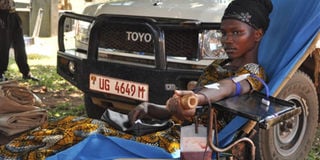Prime
Blood shortage hits hospitals

A woman donates blood during a donation drive organised by the Gulu Regional Blood Bank in Atiak Sub-county, Amuru in July 2019. PHOTO/TOBBIAS JOLLY OWINY
What you need to know:
The scarcity is partly attributed to the recent mass vaccination against Yellow Fever, which temporarily restricts vaccinated individuals from donating blood.
Hospitals and health centres across the Acholi Sub-region are grappling over scarcity of blood, Daily Monitor has learnt.
While the regional blood bank headquartered in Gulu City runs donation campaigns and periodically allocates the blood to health facilities, the demand in the past six months has since shot up.
Several public and private hospitals across the region revealed that the regional blood bank supply does not match their operational demands.
At Kitgum General Hospital, medical workers have to visit the regional blood bank twice a week for blood.
“The situation is not good, we go to Gulu Regional Blood Bank at least twice a week and they give us like 13 units [each time] while at the hospital, a long list of patients with more than double the quantity of blood issued,” Dr Geoffrey Okello, the medical superintendent of Kitgum General Hospital, said in an interview.
According to Dr Okello, children with malaria and anaemia are the most affected.
Whereas the facility requires an average of 30 units of blood per week, Dr Okello said they only get between 10 and 15 units a week, prompting them to resort to borrowing from nearby medical facilities.
“Sometimes, we go to Lamwo, Pader Health Centre IV, and Pajule Health Centre IV, if they have any blood which they have not used then we borrow. Once they are also in scarcity and we have unused units, we give them,” he said.
At Anaka Hospital in Nwoya District, Dr Joseph Ariki, the medical superintendent, said the blood transfusion rate is high due to many cases of sickle cells, anaemia, malaria and accidents.
“…The hospital is along the highway on Karuma-Pakwach road and it is a park, so accidents are rampant,” he said.
“We get blood from the regional blood bank but the only challenge is that they don’t have enough blood or the facilities they supply are very many. Even when the blood is there, the processing takes long,” he added.
Dr Ariki said they usually refer patients to St Mary Hospital Lacor and Gulu Regional Referral Hospital.
Dr Cyprian Opira, the executive director of St Mary’s Hospital Lacor, said they now encourage caretakers to donate blood.
“As a hospital, sometimes we are pushed against the wall and we ask patients to get attendants [to donate] when the blood bank says there is no more blood or blood of a particular type is not there. We can then screen test their blood and then give it to the patients who need it,’’ Dr Opira said.
“The demand and need for blood here is quite high because we have bleeding mothers, and sickle cell patients. We have big operations like of the thyroid prostrate. Sometimes, these malaria patients are anaemic and need blood,” he said.
According to him, the facility has a small branch of the Red Cross within the training institute with some students who are ready to donate blood.
This newspaper established that last week, the facility got 178 units of blood from the blood bank and another 79 units from attendants. Of these, 107 units were utilised in the children’s ward.
Dr Opira blamed the shortage on the recent mass vaccination against Yellow Fever, since the vaccinated are not allowed to donate blood.
The Gulu Regional Referral Hospital administrator, Mr James Ojwang, however, said they are not affected.
Mr Ojwang said the hospital is given priority in case of emergencies.
“Sometimes we liaise directly with the National blood bank Nakasero and blood is picked up from there and sometimes when their team is coming from there, they send [us blood], we don’t wait for blood to completely run out,” he said.
“I talked to the blood team yesterday. They went and picked blood in the morning and another blood was picked in the evening from the regional blood bank so we have not seen the shortage that much,” he added.
Mr Ojwang, however, noted that there is shortage during long school holidays because the majority of the donors are students.
Mr Polycap Okot, the Gulu Regional Blood Bank boss, yesterday said scarcity struck a month ago after the Health Ministry rolled out the mass vaccination drive against Yellow Fever.
“The WHO policy requires that once people are vaccinated, they have to be given a grace period of two to four weeks and in our case, the Health Ministry gave four weeks and during this period, and it became a huge challenge to get blood,” Mr Okot stated.
“We always have targets of how much quantity of blood we intend to collect but still it does not meet the demands of these hospitals who collect blood from us, but in the mix of the scarcity, the national blood bank has been supporting us by dispatching blood to the region,” he said.
He, however, added that the situation is stabilising.
Background
The increased demand for blood is mainly attributed to the high rate of road crashes, and surge in malaria cases among children and pregnant mothers.
While Uganda needs more than 400,000 units of blood annually, data from the Uganda Blood Transfusion Services indicates that only about 300,000 units are collected per year which is below the World Health Organisation recommended target.
On a daily basis, Uganda utilises about 1,000 units of blood.




